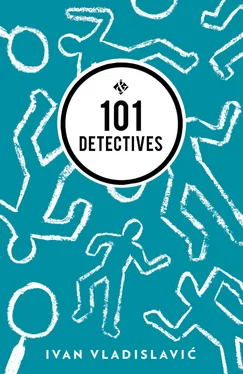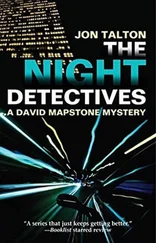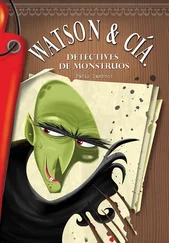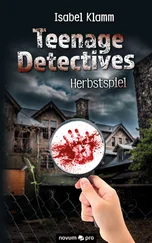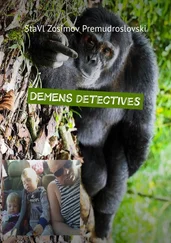Ivan Vladislavic - 101 Detectives
Здесь есть возможность читать онлайн «Ivan Vladislavic - 101 Detectives» весь текст электронной книги совершенно бесплатно (целиком полную версию без сокращений). В некоторых случаях можно слушать аудио, скачать через торрент в формате fb2 и присутствует краткое содержание. Год выпуска: 2015, Издательство: And Other Stories Publishing, Жанр: Современная проза, на английском языке. Описание произведения, (предисловие) а так же отзывы посетителей доступны на портале библиотеки ЛибКат.
- Название:101 Detectives
- Автор:
- Издательство:And Other Stories Publishing
- Жанр:
- Год:2015
- ISBN:нет данных
- Рейтинг книги:4 / 5. Голосов: 1
-
Избранное:Добавить в избранное
- Отзывы:
-
Ваша оценка:
- 80
- 1
- 2
- 3
- 4
- 5
101 Detectives: краткое содержание, описание и аннотация
Предлагаем к чтению аннотацию, описание, краткое содержание или предисловие (зависит от того, что написал сам автор книги «101 Detectives»). Если вы не нашли необходимую информацию о книге — напишите в комментариях, мы постараемся отыскать её.
and
, invites readers to do some detective work of their own. Each story can be read as a story, but many hide clues and patterns. Whether skewering extreme marketing techniques or constructing dystopian parallel universes, Vladislavic will make you look beyond appearances.
101 Detectives — читать онлайн бесплатно полную книгу (весь текст) целиком
Ниже представлен текст книги, разбитый по страницам. Система сохранения места последней прочитанной страницы, позволяет с удобством читать онлайн бесплатно книгу «101 Detectives», без необходимости каждый раз заново искать на чём Вы остановились. Поставьте закладку, и сможете в любой момент перейти на страницу, на которой закончили чтение.
Интервал:
Закладка:
The young man who had come with his girlfriend read the blurb on the back of the book, which he was holding for her; she wanted to get it signed afterwards. He wondered what life was like in Uganda now and whether there were wildlife reserves there.
Florence Lawino, the author’s guardian, the only person in the room who heard Akello’s voice falter as she began to tell about the murder of her sister, slipped her hand through the gap between two buttons on her blouse and touched the scar on her own stomach.
Something else came back to Hans Günther. It was later on the day of her visit, when he was clearing up the kitchen table, that he came across the ashtray full of Post-its. It was like a little bonfire and he felt like putting a match to it. But that was absurd. He stripped off the first of the notes and looked at it. ‘Resurrected?’ it read in his blue pen. And then in pencil the word she had suggested: ‘translated’. And then in blue again: ‘brought back, raised, revived?’ He always had other ideas. That was the problem with translation: there was always another possibility. Which made her suggestion doubly difficult. Why had she said ‘translated’? Translated from the dead. As if death itself were a language, the source language, and translation a matter of faith. Suddenly the whole enterprise felt hopeless. He opened the English version and read the phrase to himself again: brought back from the dead . It made more sense. Then he picked up the French version but did not open it. It had one of those unfussy French covers of clean white board upon which floated a picture the size of a playing card; a cross section of sugar cane in close-up, cut off between the earth and the sky. He gazed at it in despair.
It would have intrigued Hans Günther Basch to learn that Florence Lawino, whose hand caught his attention as it stirred beneath the fabric of her blouse, had a life story every bit as harrowing as her charge’s. But she had never spoken about it outside the counselling room, let alone written it down. The two of them had journeyed independently to America, but they had been placed in the same foster home because their stories were so alike. They discovered that they had grown up in villages not far apart in the Gulu District. Florence too had been abducted, she had even been in Koboko a few months before Maryam, but had left before the rebel attack. She was a little younger than Maryam, but she had become her guardian nevertheless.
She had heard Maryam speak or read at scores of briefings, conferences and workshops. In the beginning, the telling of the story, which was so like her own, left her feeling exposed, sometimes angry, but she got used to it and these days it hardly bothered her. She thought every day about what had happened to her and these memories were more vivid than any scene that could be conjured up in words by someone else. In any event, it was different here, on this evening, with Maryam reading in Acholi while the trees stood aghast behind the glass with their feet in the snow. It was as if Maryam was speaking only to her.
As she listened to the story, so familiar she could recite parts of it by heart, her hand moved along the livid blanket stitch of scar tissue. With her middle finger she followed the ridge from her navel to her hipbone, tracing each of the eleven stitches, first the part above the slash and then the part below, while in her mind she passed down a corridor, trying the doors on one side and then the other, and found them all locked.
There were no clues in Akello’s reading to indicate when she might stop: the listeners could not judge whether a passage was rising to a climax or falling to a resolution, and so their attention was not modulated by the usual sense of anticipation that accompanies a reading in a familiar language. She gave nothing away, neither speeding up nor slowing down, and never once looking up from the page. Again Andrij Leonenko, the young poet in the fourth row, had the impression that her eyes were closed and she was reciting from memory. She turned the pages so precisely, rolling back one after the other with exactly the same gesture and without licking her finger. When she did stop it was not abrupt but final, given the same flat emphasis with which she had begun. She did not smile or say thank you. She gathered up her papers, squared them once against the lectern and went back to her seat.
The audience drifted for a moment on the receding tide of her voice, then roused themselves and applauded. At the same time, they began to do all the things people do when the hold of a crowd relaxes and releases them back into their separate bodies, sitting up straight, stretching their legs, arching their backs, craning their necks, clearing their throats.
To Karolina Fischer, the events coordinator of the Literaturhaus, the squealing and screeching from the chairs was intolerable. It was like the cacophony that arose when you walked into the House of Tropical Birds at the Tiergarten. But before she could start going over the whole saga of the chairs in her mind, something distracted her. She noticed that the woman next to her was wearing some kind of safari suit, and that the khaki tunic had tiny patches of leopard skin scattered over it at random, triangles and parallelograms with loose flaps and tabs that suggested they had a purpose that was not simply decorative, like storing bullets or securing a water bottle or a bush knife.
As the applause drained away, the members of the audience began to do many other things with their hands, patting their knees, straightening their skirts, winding off scarves, pushing back cuffs to glance at watches, folding the creased and sweaty programmes they had been holding and putting them in their handbags, retrieving the crisp progammes they had put away in their handbags and smoothing them out on their laps, fumbling in the pockets of the jackets hanging over the backs of their chairs for tissues, cough lozenges, antacid tablets, lip balm, cleaning their glasses on the tails of their shirts, rubbing their palms together, covering their yawning mouths. Nearly all of those who were on their own checked their cellphones for messages; nearly all of those who had company turned to their companions to exchange stored-up observations.
The young man who was attending his first literary reading said that it was fascinating, he was enjoying himself very much, but the way he said it made his new girlfriend wonder whether he was telling the truth, and anyway how could you enjoy something that was so sad, even if you couldn’t follow the exact words?
Prof. Ziegler scratched the inside of her thigh, although it was not really itchy any more, and then turning to survey the room behind her caught the eye of an old student of hers a few rows back. He mouthed an enquiry after her health and she smiled and nodded and mouthed that she was fine, fine.
Andrij Leonenko took out a small red notebook with a spiral binding, turned to a clean page and, shielding it from view with his free hand, jotted down a phrase that had come to him ten minutes earlier and might be the first line of a poem: ‘You read with your eyes closed.’
Horst Grundmann leant over to his wife Sylvia and asked her whether she had remembered to let Bertram know about Thursday, and she said yes, he’d said it was no problem. And then he leant to the other side and said to Florence that Maryam had read superbly, and Florence said yes, it had been very good.
Rolf Backer, the commissioning editor from Kleinbach, a tall man who usually covered his shaven head with a soft felt hat that made him feel (and he hoped look) like a writer himself, but which he had checked at the cloakroom out of consideration for the people sitting behind him, remarked to his companion Theo van Roosbroeck, a Belgian political theorist who had written about the militia in the Democratic Republic of Congo, that Akello was a brave girl, and Theo replied that she was pretty too, although she’d had the stuffing knocked out of her, understandably so, and they agreed that it was a terrible thing that had happened to her, but that she’d overcome adversity in a way that was truly inspiring. To himself, Theo noted that people in Europe were tired of stories like this, sad as they were, and wondered whether his friend Rolf might not find it easier to market someone who gave the impression of being less resigned to her fate.
Читать дальшеИнтервал:
Закладка:
Похожие книги на «101 Detectives»
Представляем Вашему вниманию похожие книги на «101 Detectives» списком для выбора. Мы отобрали схожую по названию и смыслу литературу в надежде предоставить читателям больше вариантов отыскать новые, интересные, ещё непрочитанные произведения.
Обсуждение, отзывы о книге «101 Detectives» и просто собственные мнения читателей. Оставьте ваши комментарии, напишите, что Вы думаете о произведении, его смысле или главных героях. Укажите что конкретно понравилось, а что нет, и почему Вы так считаете.
